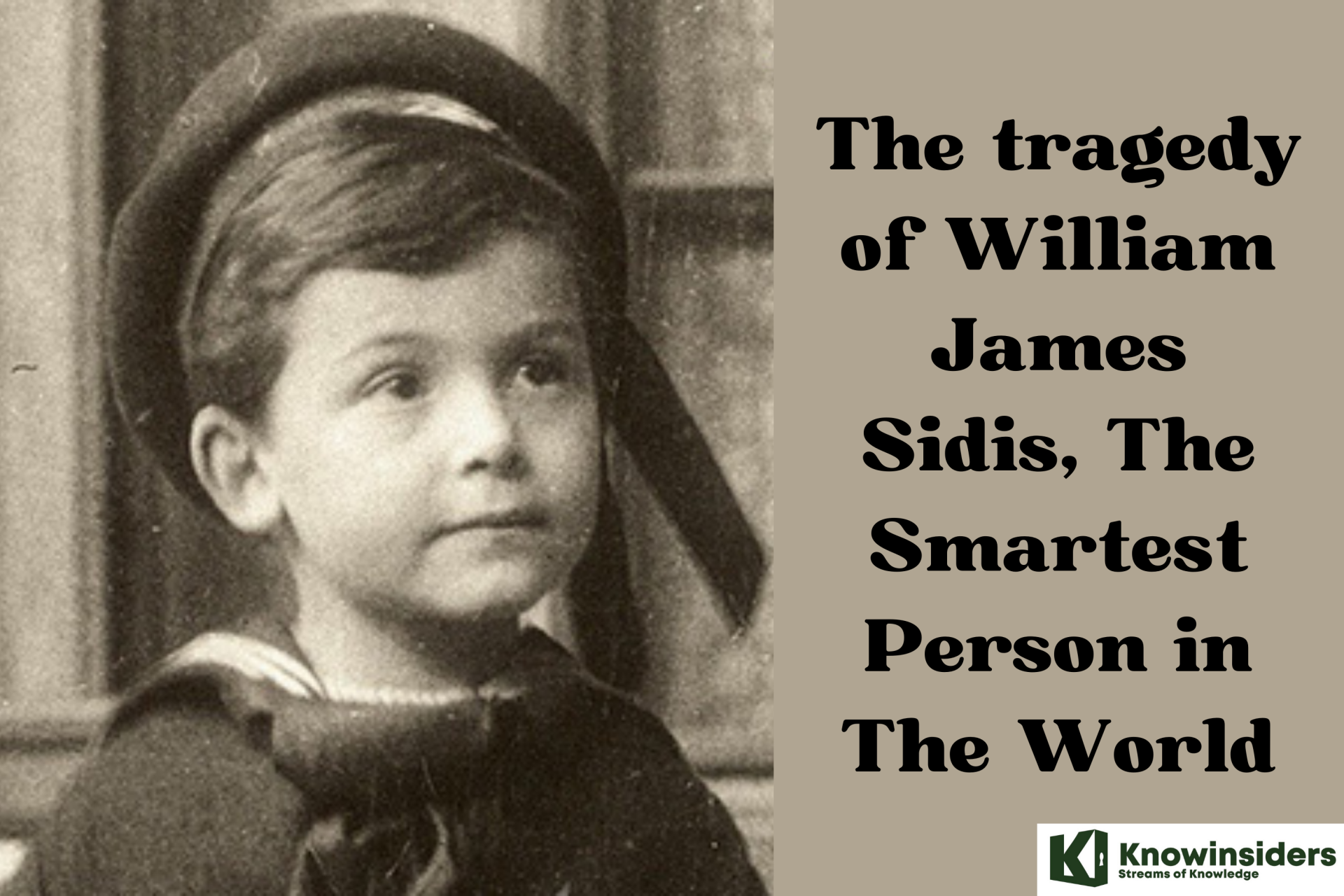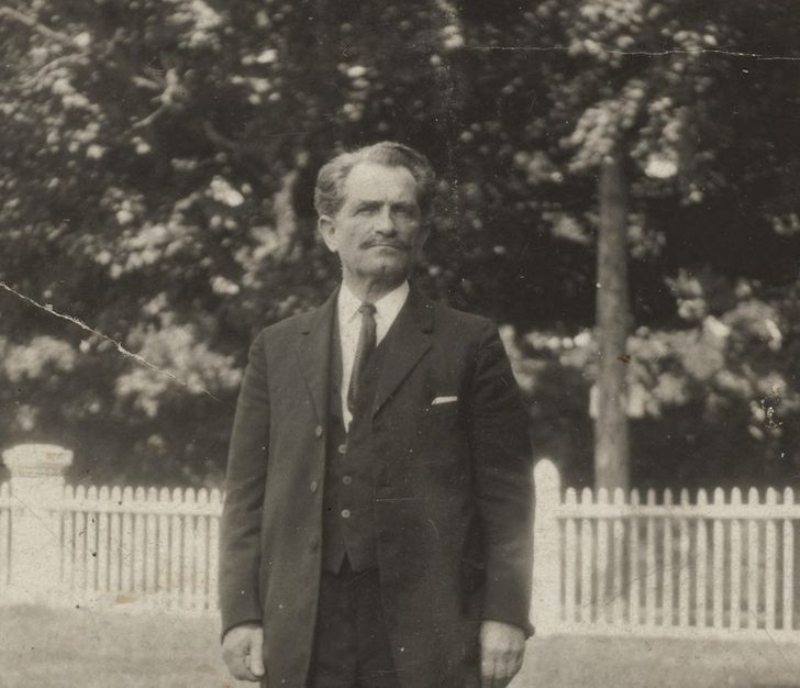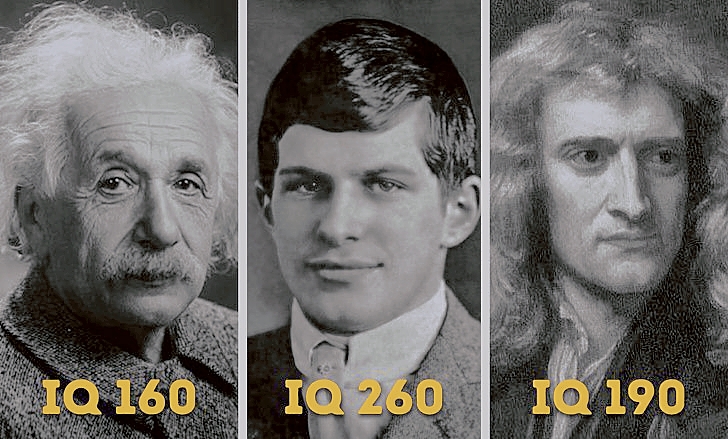Tragedy of William James Sidis - Smartest Person Ever Lived in the World
 |
| Tragedy of William James Sidis, The Smartest Person |
Albert Einstein, Charles Darwin, Stephen Hawking ― these are just a few immortal names who transformed our understanding of the world and universe.
William James Sidis is neither famous nor celebrated today. Only a handful of people know how incredible he was. He never received recognition for his work and never found true happiness during his lifetime.
However, by some accounts, William James Sidis was the most intelligent person in recorded history. His estimated IQ score was 200-300 points compared to Einstein and Hawking (around 160), never mind the average score of 100. But his intelligence couldn't save him from his demons.
William James Sidis: A Young Genius
William James Sidis (it’s pronounced Sy-dis) was born in New York on April 1, 1898. His Ukrainian-born father, Boris Sidis, had emigrated to the United States in 1887, after two years’ imprisonment in czarist Russia, as punishment for teaching reading to peasants. His mother, the former Sarah Mandelbaum, was also from Russia and had emigrated with her father in 1889, at age 13, after surviving a pogrom.
Both parents were highly intelligent and ambitious. Boris attained his bachelor’s and master’s degrees from Harvard University in three years. He then attended medical school, becoming a psychiatrist who specialized in abnormal psychology.
He met Sarah in an English class he taught. With his encouragement, Sarah became one of the first women to attend medical school at Boston University.
William was named after the psychologist William James, his father’s friend, and showed signs of being special from early on. He spoke his first word at six months and was reading the New York Times at a year and a half.
The Influence of William James Sidis’ Parents
 |
| Photo: vietnamnet |
His parents were equally intelligent and ambitious. His father attained his Bachelor’s and Master’s degree from Harvard in only three years. He went on to become a psychiatrist, specializing in abnormal psychology.
His mother was just as impressive. She was one of the first women to attend medical school at Boston University, where she graduated as a doctor.
By age three, having taught himself to type, he wrote Macy’s a letter ordering toys, and by eight, he had mastered Latin, Greek, German, Russian, Hebrew, Turkish, French, Armenian – and also invented his own virtual language, which he called Vendergood.
To understand William, we have to examine the intentions of his parents. His parents were poor Russian immigrants, but within 10 years, Boris had attained a B.A, an M.A, and a Ph.D. in psychology. Sarah had her M.D in medicine.
His parents wanted to prove that if parents were swift enough and used the right methods, children could unlock their potential. In a way, William was their guinea pig.
Rather than nurture him with love, reassurance, and warmth, they focused on his intellectual side, and the publicity. His parents decided that when William was 5 months old, he should be treated as an adult.
He sat at the dining table and was included in all manner of adult talk, learning to use cutlery to feed himself. His parents were always around to answer his questions and encourage his learning. They didn’t need to. William found ways to occupy himself.
All of this he did with the coaching of his father, who was determined to demonstrate that genius could be cultivated in a child.
Harvard At 11 Years Old
Sidis was accepted to Harvard at age 9, but the school wanted him to wait until he was 11. Five years later, he graduated cum laude.
His Harvard days, however, were not full of happy memories.
"He had been made a laughing stock at Harvard," Wallace says. "He admitted he had never kissed a girl. He was teased and chased, and it was just humiliating. And all he wanted was to be away from academia [and] be a regular working man."
The IQ Of William James Sidis
 |
| Photo: kenh14 |
Wikimedia CommonsThe town of Cambridge, Massachusetts, home of Harvard University, in the 1910s.
Much speculation has been made over the years about William Sidis’ IQ. Any records of his IQ testing have been lost to time, so modern-day historians are forced to estimate.
For context, 100 is considered an average IQ score, while below 70 is often viewed as substandard. Anything above 130 is considered gifted or very advanced.
Some historical IQs that have been reverse-analyzed include Albert Einstein with 160, Leonardo da Vinci with 180, and Isaac Newton with 190.
As for William James Sidis, he had an estimated IQ of around 250 to 300.
Anybody with a high IQ will be happy to tell you it’s meaningless (though they’ll probably still be a little smug). But Sidis was so smart that his IQ was the same amount as three average human beings combined.
But despite his intelligence, he struggled to fit in with a world full of people who didn’t understand him.
After he graduated from Harvard at age 16, he told reporters, “I want to live the perfect life. The only way to live the perfect life is to live it in seclusion. I have always hated crowds.”
The boy wonder’s plan worked about as well as you would think, especially for a person who had already been famous for so long.
For a short period of time, he taught mathematics at Rice Institute in Houston, Texas. But he was all but driven out, partially due to the fact that he was younger than many of his students.
A Brilliant Mind With Humble Aspirations
When William James Sidis first graduated in 1914, he gave an interview to a local newspaper and stated his intentions to live the perfect life of celibacy and isolation. He hated crowds in particular, though. Who doesn't?
After ten ineffectual years in education, Sidis' life deteriorated when he got in trouble with the authorities for the first time. While attending a Socialist march in Boston in 1919, violence broke out. It is not clear whether William instigated this or not. Regardless, he was handed an 18-month prison sentence for his troubles.
William's father kept him out of prison by making him stay in a sanitorium for a year. After that, William lived in California for a year before moving back to the East Coast again. In 1921, his intentions were the same as in 1914 ― he wanted to lead a simple life and be relatively unknown.
Sidis hoped to remain anonymous by working in a series of mundane roles in New York. Performing simple accounting tasks was an incredible waste of William's talent, but he was content so long as nobody recognized him. If ever this happened, he would promptly look for another job.
An Early & Unexpected Death
Alongside his unfulfilling work, Sidis occupied himself by publishing articles and books using a pseudonym in his later years. For example, he wrote about American history and public transport. His work was not famous, but that did not matter to William.
Another controversial episode in the life of William James Sidis occurred in 1937 when he sued the New Yorker newspaper for publishing statements about him that were apparently false. William was finally given compensation in 1944.
By that year, William had returned to Boston. On July 17th, 1944, 46-year old Sidis was found dead in his apartment. What killed him was cerebral hemorrhage. This was the cause of his father's death years earlier.
The most brilliant man ever died broke, and his genius never reached its full potential.
The Challenges of Giftedness from William Sidis's TaleWilliam Sidis remains the premiere case study of a "failed" child prodigy. Over the years, education experts, the media and everyday parents of non-prodigies have pointed fingers at Boris and Sarah for being too pushy, too concerned about their son's academics, and not worried enough about producing a well-rounded child. William's story still fuels the debate on how a gifted child should be raised, and whether giftedness is something that is inherited — as Boris and Sarah believed — or if it's more influenced by environment. Major academic studies have looked into child prodigies and how they fare in later life. A famed one, the Terman Study of the Gifted (originally known as Genetic Studies of Genius), was begun in 1921 by Stanford psychologist Lewis Terman. It followed more than 1,500 students for more than 80 years. The Terman study has been criticized by many over the years. But its findings, in large part, still hold up, and its data continues to be used by social scientists today. "Terman's work, following these people over 50+ years, even past the end of his lifetime, showed that most [prodigies] did in fact turn out to be well adjusted as adults and successful," Matthews says. Although the media these days doesn't seem to track child geniuses the way it did with William in the early part of the 20th century — there are exceptions, like the three Polgár sisters, Hungarian chess prodigies — a fascination with the extremely smart, extremely talented and extremely young remains. That's one reason there is a National Association for Gifted Children. |
 Who is Jeff Bezos’ Girlfriend Lauren Sanchez and Relationship Timeline Who is Jeff Bezos’ Girlfriend Lauren Sanchez and Relationship Timeline Jeff Bezos and Lauren Sanchez have now possibly spurred into a surprise engagement. Here, explore the billionaire CEO and former news anchor’s headline-making romance. |
 Who is Stephanie Soo: Biography, Age, Fiancé, Net Worth and More Who is Stephanie Soo: Biography, Age, Fiancé, Net Worth and More Stephanie Soo, best known for creating mukbang videos, is one of the hottest YouTube creators with over two million followers. Keep reading to know more ... |























